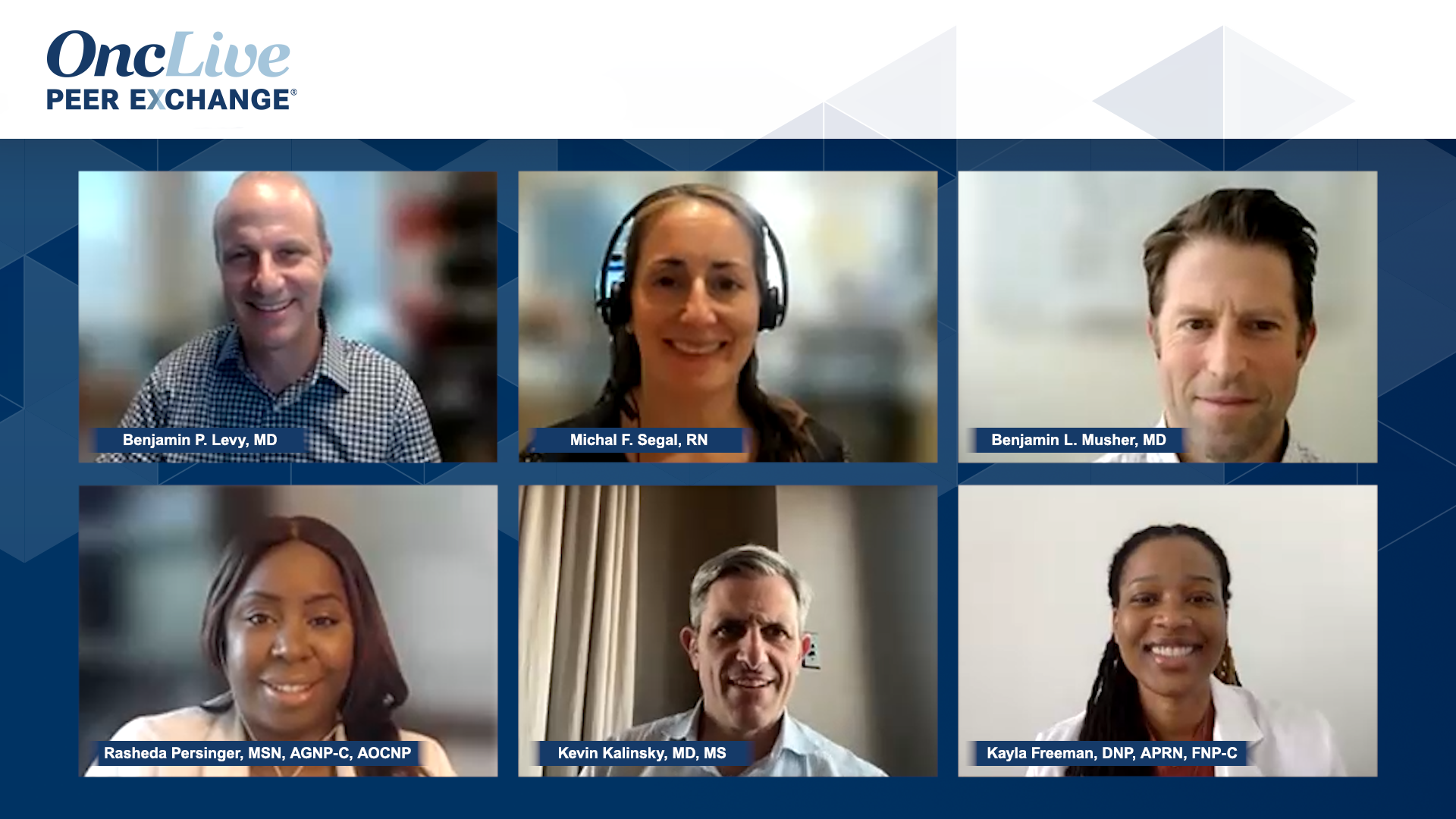- Advertise
- About OncLive
- Editorial Board
- MJH Life Sciences brands
- Contact Us
- Privacy
- Terms & Conditions
- Do Not Sell My Information
2 Clarke Drive
Suite 100
Cranbury, NJ 08512
© 2025 MJH Life Sciences™ and OncLive - Clinical Oncology News, Cancer Expert Insights. All rights reserved.
Overview of Antibody-Drug Conjugates (ADCs)
A panel of cancer-treating specialists introduce the discussion with a broad overview of antibody-drug conjugates (ADCs).
Sponsored in part by Daiichi Sankyo. Content independently developed by OncLive®.
Transcript:
Benjamin P. Levy, MD: Hello and welcome to this OncLive Peer Exchange titled “Antibody-Drug Conjugates and Cancer Treatment.” I’m Dr Benjamin Levy. I’m an associate professor at Johns Hopkins School of Medicine [in Washington, DC] and a lung cancer doctor. I’m here with a tumor panel, and joining me for this discussion are MDs, nurse practitioners, and nurses. It takes a village to treat our patients so it’s appropriate to have everyone here. I’ll start with Ben Musher. Do you want to introduce yourself?
Benjamin L. Musher, MD: [I’m]Ben Musher, associate professor of medicine, from the Baylor College of Medicine, Houston, [Texas, and a] medical oncologist at the Dan L. Duncan Comprehensive Cancer Center. I’m also the director of the GI [gastrointestinal] Cancer Working Group here. Thank you for inviting me.
Benjamin P. Levy, MD: Thanks, Ben. Kevin?
Kevin Kalinsky, MD, MS: Hi, I’m Kevin Kalinsky. I’m a breast medical oncologist. I’m a professor of medicine and director of the Family Breast Center Winship Cancer Institute in Atlanta, [Georgia].
Benjamin P. Levy, MD: Rasheda?
Rasheda Persinger, MSN, AGNP-C, AOCNP: Hi, my name is Rasheda Persinger. I’m a thoracic medical oncology nurse practitioner at the Sidney Kimmel Cancer Center [in Washington, DC]. I’m at Sibley Memorial Hospital, which is part of Johns Hopkins. And I had the pleasure of partnering with Dr Benjamin Levy.Thank you for having me.
Benjamin P. Levy, MD: Kayla?
Kayla Freeman, DNP, APRN, FNP-C: Hi, my name is Kayla Freeman. I’m one of the nurse practitioners, at Winship Cancer Institute of Emory University, [in Atlanta Georgia]. I work in breast oncology, working closely alongside Dr Kalinsky. Thanks for having me.
Benjamin P. Levy, MD: And then finally, Michal?
Michal F. Segal, RN: Thank you. My name is Michal Segal. I’m a clinical trials nurse at Memorial Sloan Kettering Cancer Center, [New York, New York]. I work specifically with Yelena Y. Janjigian and a few other GI medical oncologists. And most of my trials are gastroesophageal.
Benjamin P. Levy, MD: Great, it’s a pleasure to have you all. Appropriate to have everyone in different disciplines. I think all of us in these different disciplines may have different therapeutics in our armamentarium. I think strategically and thematically, we’re starting to do the treatments that are predicated on more personalized care. We’ve had chemotherapy, we’ve had targeted therapy, we have immunotherapy. I think these are all great drugs that we can use. But perhaps the new kids on the block, at least for lung [cancer], are these antibody-drug conjugates [ADCs]. Maybe we can start [with you, Kevin] to talk about just the elements of an ADC and go through those elements and the importance of each.
Kevin Kalinsky, MD, MS: Sure, I’m happy to say I’ll keep it broad because I know we’re going to get into some specifics about ADCs. So these are designed where they are an antibody that is targeting a specific protein or, for instance, Trop2…, is linked to a cytotoxic agent. These really are discriminated against one another based upon the target. They are different in terms of the immunogenicity that they may generate. There are also differences in the linkers. Some of the linkers, for instance, are cleaved more, and some are noncleavable. A lot of these are proprietaries that are generated by specific sponsors, and then the toxicity profile is often determined by the payload as well. And we have some payloads for drugs that are commercially available, or we may see neuropathy. We have others where we see different sorts of toxicities, including interstitial pneumonitis, and we’ll discriminate some of these out. But the way that I talk about these drugs with patients—and I’m curious if others on the call have a way that they describe it—but, generally, I say, “Well, listen, the way that your GPS told you how to get to the center is the way we can think about ADCs, where we know where it is, and it’s directly delivering chemotherapy to those cancer cells. [It’s also] understanding that sometimes there can be a bystander effect as well, which may help explain some of the significant efficacy that we’re seeing with some of our agents.
Benjamin P. Levy, MD: Great overview. It seems simple, 3 key elements: an antibody, a linker, and a payload. But we’re still wrestling with different antibodies, different linkers, and proprietary payloads. I’ll just put my nickel down and say it’s a Javelin missile, but I like your GPS analogy better.
Transcript is AI-generated and edited for clarity and readability.
Clinicians referring a patient to MSK can do so by visiting msk.org/refer, emailing referapatient@mskcc.org, or by calling 833-315-2722.
Related Content:





